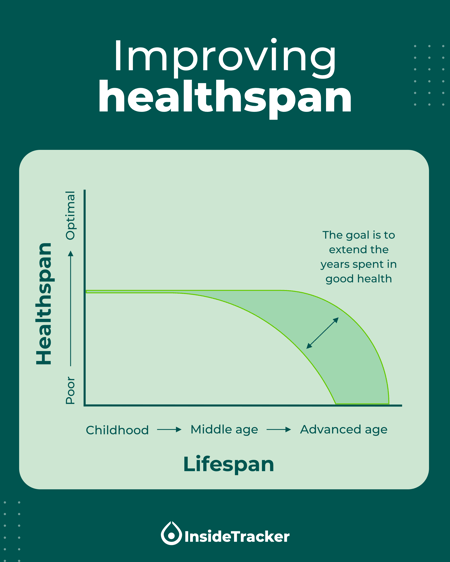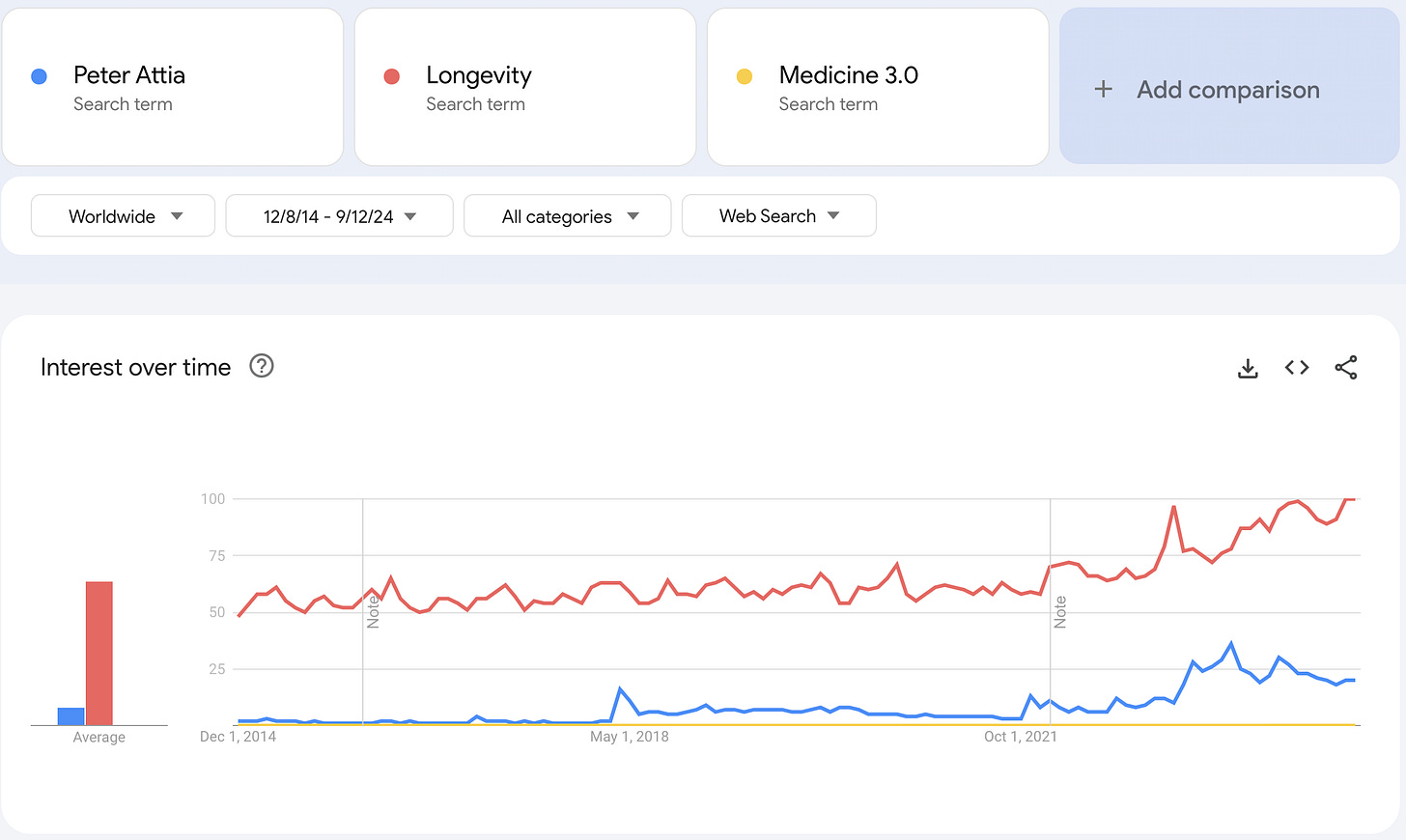Roundup of what caught my eye + thoughts on Peter Attia and the longevity trend
AI marketing tools, EU overregulation, North Korea and lots about Longevity. Read on!!
AI stuff
AI generated marketing assets have been mostly miss so far, but I came across an interesting looking tool that looks impressive. This looks like it’s also finally getting good. If you’re in marketing or building in eCommerce, please try it and let me know how it does!
A good take on the EU’s over-regulation of AI and Big Tech. I found this in Benedict Evans’ newsletter, and I cannot hope to summarize it better than he did, so here are his words:
"John Gruber on the evolution of the EU’s attempts to micromanage Apple products. Opinions vary on the merits of these proposals themselves, but the EU clearly thought that it would tell Apple to do ‘X’ and consumers would get more competition. Instead, Apple is only making changes in the EU, and the EU is not actually a large enough digital market (less than 10% of the App Store, for example) for changes that only apply in the EU to alter the developer ecosystem. Meanwhile, the EU’s attempt to be ‘principles-based’ has too often turned out merely to be unpredictable and arbitrary, which means Apple and other tech companies launch products there later and in more limited ways. The result may be that EU consumers get the downsides of the regulations without the upside: they get products significantly later, that work less well, without getting any more competition."
Apart from 'owning the workflow' there might be another interesting way to build defensible AI products: boundary crossing...
Apple Intelligence can cross model boundaries. They'll use OpenAI, their own models, and can easily also integrate future Claudes if they are better or cheaper. But Apple Intelligence will never be tightly integrated with Google Suite or WhatsApp.
OpenAI can cross channel boundaries, they could integrate with Slack, Apple, Google and Microsoft. But they will never offer the ability to switch to Claude for coding tasks.
If you create a product that has a compelling use case, that crosses both model boundaries and channel boundaries, it will likely be safe at least from the behemoths. This relates to my idea for the wrapper above as well.
Random interests
This Sports Bar in LA looks absolutely crazy!! It has a wrap around screen that makes it seem as though you’re actually in the stadium. I would love to experience this.
Music
I wondered briefly if I would be snobbish enough to bring Information Theory into music, and I decided that yes, I am. Claude Shannon mathematically showed that the amount of information content of any message is dependent on how surprising it is. This led him to invent the ‘bit’ as the unit of information that we still use today. Let’s say we have the starting phrase: “Roses are red”, then the information content of the following phrase “Violets are blue” would be near zero. On the other hand if the opening phrase is followed by “cows are brown” the information content would be much higher. If it was “The quadratic formula solves for X”, it would be higher still. Surprise is information. That applies to humor, books, films and also music.
It’s not always desirable to have high information music. As background sound when concentrating for example, it would be too distracting.
That’s a long intro just to post a great song of a modern Blues Rock band. It sounds like roses are red, until the chorus comes in with a chord progression and melody that feels like it got lifted from a pop song. Underrated band!
Longevity
In my peer group of early middle age millennials, longevity is a big topic. Peter Attia is a popular influencer, and everyone has eaten his book Outlive, which is excellent by the way. But at the same time, people are taking some supplements here and there and exercising a bit more, but don’t seem prepared to really do the harder things you’d need to do to really maximize healthspan. Because that would be boring and exhausting. Came across a good post about this phenomenon. The most interesting part is not that people are looking for silver bullets, that’s universal. But that people are doing these heart scans, blood tests, and continuous glucose monitoring things and then don’t act on the gathered data at all. In that case, why do it? It’s just a hobby, I suppose.
Original thoughts
I posted on LinkedIn this week a concept made with V0 for an AI wrapper that does some things I can’t find in the market.
Some more thoughts on the longevity and healthcare 3.0 trend
Millennials are around 40 years old! They are starting to feel the first signs of aging. I personally experienced my first overnight stay in a hospital in the beginning of 2023, to get my appendix removed. A few weeks after that, my fitness level, as measured by VO2Max, reached an all-time low of 37.5 and I had a scary episode of heart arrhythmia (benign thankfully). My most important reflection at the end of 2023 was: Don’t take your health for granted.
This fits in with a growing number of my peers. And we all read Outlive by Peter Attia. This book articulates the goal to increase healthspan, i.e. that period of life where you are in good health, able to do lots of things. When you’re 80 years old, you still want to be able to climb 2 flights of stairs unassisted, carrying a bag of groceries. Ideally, we would be healthy and strong until we suddenly drop dead at 120 years old, avoiding any real suffering and period of disease.

The core premise of the book is that if you want to maximize your chances of that happening, you have to take action NOW. It’s quite motivating!
The book also promotes an aggressive early testing regimen including regular colonoscopies from age 40 (not looking forward to that), and extremely aggressive intervention, with drugs if needed, to bring cholesterol levels down. It’s interesting that a lot of people are seemingly doing these tests for fun, or out of interest but without the intent to actually take action based on them. But that’s not the only interesting part.
An explosion of startups
Startups who help people run the Longevity or Medicine 3.0 playbook are booming. They can be bucketed along: preventing premature death, slowing the aging process, and reversing aging. The one I personally am most familiar with is Singapore based startup Mito Health. They provide access to testing, and an app to coach people to implement the test based actions. As much as I love Mito and admire their flawless execution, I would be surprised if it becomes a unicorn.
Increasing health span is strongly subject to the 80/20 rule
Peter Attia’s super deep and detailed content on the 20% notwithstanding, even he admits readily that just by exercising more and eating a bit better, people are 80% there in terms of improving their health span. With regard to diet, it boils down to Michael Pollan's timeless mandate: “Eat food, mostly plants, not too much.”
With regard to exercise, both endurance and strength is important. But incremental returns diminish very quickly. For a sedentary person who never exercises, just starting a habit of walking(!) every day for 30 minutes is already transformative for their health. “Exercise is by far the most potent longevity 'drug’” says Peter Attia. There is absolutely no point taking Metformin for someone who eats junkfood and never exercises.
The point is, there is no need for a personalized AI to tell you this. All you need is a way to implement a basic exercise regimen and make better food choices. Therefore, I believe the the app and AI assistant part of startups like Mito is pretty low value-add. The real value lies in making it much easier to do early testing. It seems to me that regular labs would catch-on and start offering these test packages sooner rather than later. There seems to me to be quite limited defensibility in either of the pillars (testing access and personalized advise).
What I’m saying is that the core premise: “personalized preventative strategies are key to extending health span” is somewhat shaky. My conclusion from the content is that it’s more like: “a common set of basic preventative strategies are key to extending health span”. And at the end of the day, the implementation of even those basic strategies is where it goes wrong for the vast majority of people.
Loosely held view on this and still love Mito and Peter Attia
Having said all that, I’m maybe only about 75% sure that I’m right on this. I have been convinced by Peter Attia that regular testing from the age of 40 or mid 30s, or whenever around that time is a good idea. The blood and microbiome tests I did last year were insightful and led to changes that I believe improved my wellbeing in the short term. They were: more exercise, correcting low Vitamin D level, and a set of diet interventions to repair my microbiome after the operation.
I also want to make sure that I give you, reader, the right takeaway wrt my personal view on Peter Attia and Outlive. I loved the book. Before reading it I thought Peter Attia was one of those health charlatans like Andrew Huberman. But the book very pleasantly surprised me on this front. Attia actually started to implement his views with real patients, and he was open minded and accountable enough to let the outcomes change his mind on a large number of things.
He used to believe the Keto Diet was good for everyone. He discovered that it’s only beneficial for a very small percentage of people and detrimental to the vast majority.
He used to believe that intermittent fasting had all kinds of protective long-term effects, a common believe based mostly on a very bad study in monkeys1. He changed his mind completely on this.
He is still extremely hardcore about cholesterol. But in his efforts to find truth he keeps track of good science without cherry picking and interprets it quite well.
The book is worth reading for many reasons, one of them being the best explanation I’ve ever read for why it is so damn hard to study whether anything is healthy or unhealthy.
So, to end this week’s newsletter:
Eat food, mostly plants, not too much
Exercise
It might be worth it to do some blood tests
Basically, they fed one set of monkeys a ton of super sugary junk food and the other group a lot less of the same crap. The group who ate less lived longer. Another group repeated the experiment using a different type of food which is closer to what monkeys normally eat and the difference between the fasting and non-fasting groups disappeared. The first study’s actual outcome was not fasting makes you live longer, but it was actually eating nothing but MacDonalds every single day of your life is bad for you. NO SHIT!




